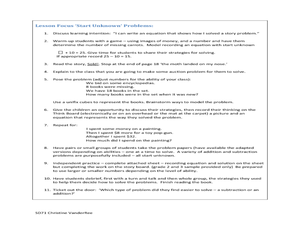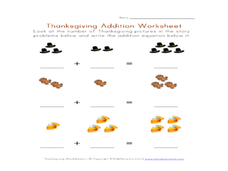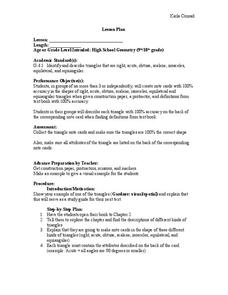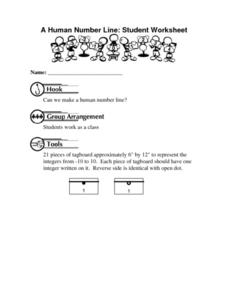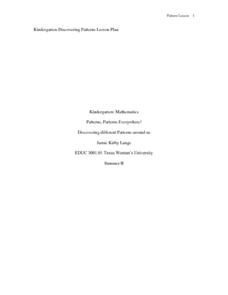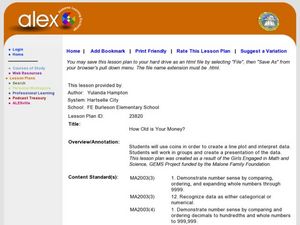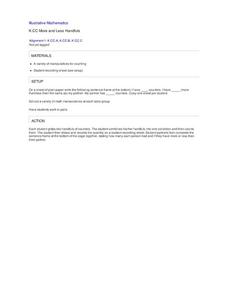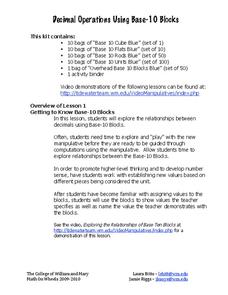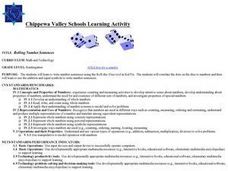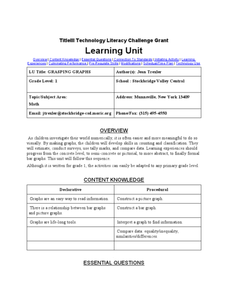Curated OER
Charging Up, Charging Down: Exponential Models
Students collect and analyze voltage data. In this math lesson, students investigate exponential functions using the TI and a Voltage Probe. They graph their data and analyze it using a table.
Curated OER
Solve Story Problems: Sold! A Mathematics Adventure
Young mathematicians listen to the book Sold!: A Mathematics Adventure by Nathan Zimelman where they encounter ways to solve story problems. They then create and solve start unknown addition and subtraction equations. Resource builds in...
Curated OER
Book Title: Ten Flashing Fireflies
This instructional activity engages learners in a variety of activities to build 1 to 1 correspondence, estimation, and problem solving skills. They discuss problem solving strategies, hear the story Ten Flashing Fireflies, compose their...
Pennsylvania Department of Education
Analyzing Numeric and Geometric Patterns of Paper Pool
Students use concrete and pictorial representation of geometric patterns to extend patterns. In this geometric patterns lesson plan, students identify patterns and extend them.
Curated OER
Thanksgiving Addition Worksheet
In this addition skills worksheet, students examine the Thanksgiving counters in each of 3 pictorial number sentences and fill in the blanks with the number that describes each group of counters.
Curated OER
Identify triangles
Students explore triangles. In this geometry instructional activity, students will create note cards with pictorial depictions of right, acute,obtuse, scalene, isosceles, equilateral and equiangular triangles. Students will verbally...
Curated OER
Junk Yard Math
Third graders explore the process of place value and subtraction through regrouping and borrowing exercises. Several activities using manipulatives are utilized in the activity.
Curated OER
Time Flies When Math Is Fun
Third graders pracdtice telling time with a demonstration clock.
Curated OER
Creating a Thematic Map
Students create and analyze a weather-related data table and a thematic map based upon information provided.
Curated OER
A Human Number Line: Student Worksheet
Kids are challenged to make a human number line. They line up, holding numbers from -10 to 10. They then add and subtract both positive and negative numbers, using themselves as the numbers on the number line. This is a great way to...
Texas Woman’s University
Patterns, Patterns Everywhere!
Not only is pattern recognition an essential skill for young children to develop, it's also a lot of fun to teach! Over the course of this lesson, class members participate in shared readings, perform small group activities, and complete...
Alabama Learning Exchange
How Old is Your Money?
Elementary learners explore coin mint dates. First, they listen to the book Alexander Who Used to be Rich Last Sunday by Judith Viorst. They then sort a collection of coins according to their mint date and put them in order from oldest...
Curated OER
More and Less Handfuls
Working as a pair, two kindergartners will sit at a table and will pick two handfuls of counters. They will combine their individual handfuls into one, and count their own selection. They will then draw and record their count on a record...
College of William and Mary
Decimal Operations Using Base 10 Blocks
Let's get this block party started and learn about decimals! Here are four main lessons that teach the operations with decimals while using base 10 blocks to provide a hands-on learning approach. Supplemental worksheets and other...
Alabama Learning Exchange
Yummy Apples!
Young learners listen to a read aloud of Gail Gibbons book, Apples and the story A Red House With No Windows and No Doors. They compare characteristics of a number of kinds of apples, graph them and create a apple print picture. Learners...
Curated OER
Tiles, Blocks, Sapphires & Gold: Designing a Treasure Map
Young cartographers in groups hide treasure at school and then create a map to find it using pattern blocks and tiles. They make paintings with clues to create a visual representation of the location of their treasure. Groups present...
Curated OER
Rolling Number Sentences
Budding mathematicians investigate how to write number sentences using the Roll-the-Dice tool in "Kid Pix". They correlate the dots on the dice to numbers and then learn to use the addition and equal symbols to write number sentences....
Curated OER
Many Ways to Represent Our Data
Demonstrate several ways to represent data with your class. They will use surveys to gather data and display the data using tally charts and graphs. Then answer questions according to the data.
Curated OER
Build a Bar Graph
Learners discover how to use bar graphs. They will gather and organize specific data in order to put it into a bar graph. Then they will answer several questions based on the information they have graphed.
Curated OER
Compound Inequalities and Graphing
Put geometry skills to the test! Learners solve compound inequalities and then graph the inequalities on a coordinate plane using their geometric skills. They identify the slope and y-intercept in order to graph correctly. I like this...
Illustrative Mathematics
Naming the Whole for a Fraction
How many different ways can you represent a whole? In a picture that represents six parts (two of which are shaded), learners are asked to label the parts appropriately to show how three different mathematical interpretations can be...
Illustrative Mathematics
Running to School, Variation 3
How far is it between school and home? Here is a relatable activity where the participant runs to school a certain fraction of the way. That distance is given in miles. It is up to your learners to determine the distance between home and...
Curated OER
Technology Literacy Challenge Grant Learning Unit
First graders explore counting and classification. They sort leaves, create graphs, write sentences for the data in the graphs, develop graphs for shapes, favorite animals, birthdays, and participate in a die prediction game.
Curated OER
Patterning Pictorial
First graders describe and create simple patterns. They identify patterns in the environment. They extend and reproduce patterns.



